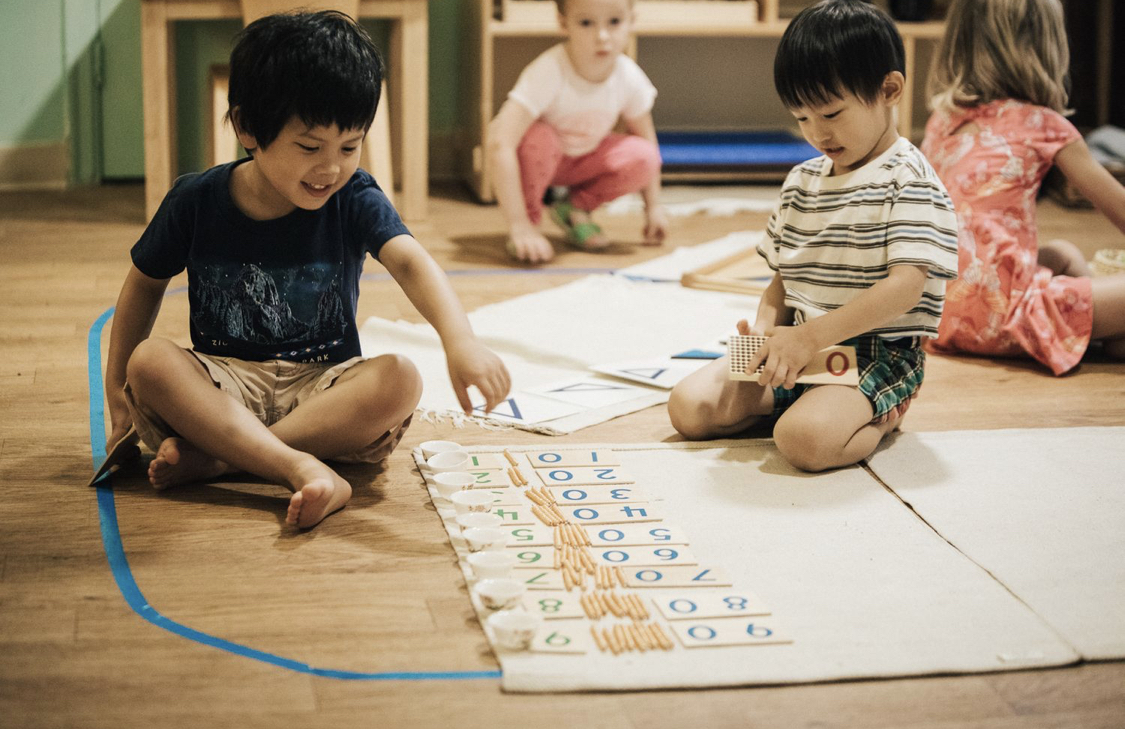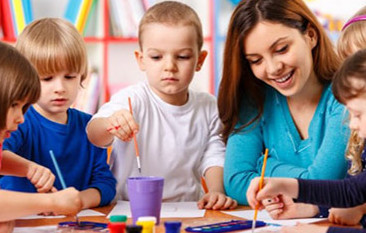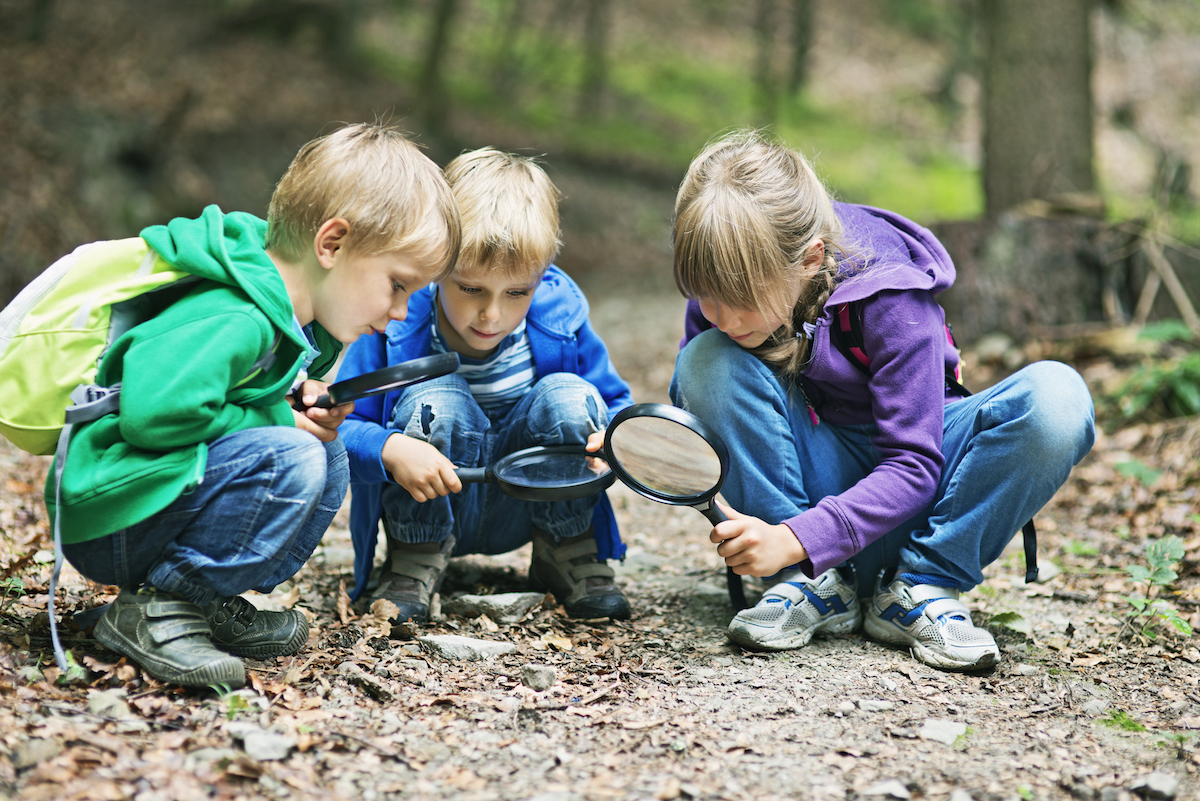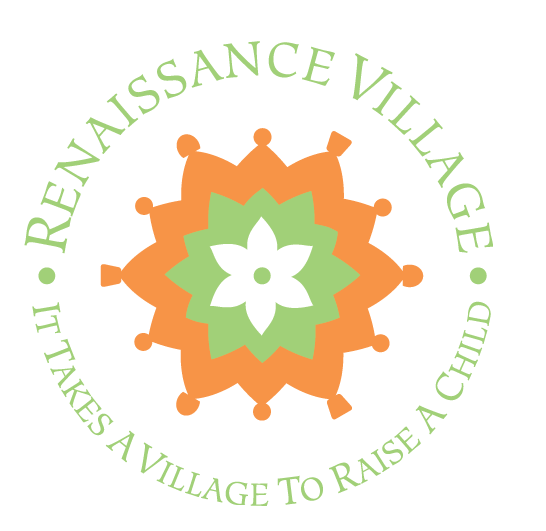Academic Programming
Renaissance Village Montessori offers a welcoming, stimulating environment that cultivates your child’s independence, self-esteem and social & academic potential, with an individualized curriculum that will lay the foundation for a lifelong love of learning.
“The Montessori classroom is functionally arranged for the child, allowing him to work, move and develop freely.”
– Maria Montessori


Toddlers (Ages 2-3 years)
The main goal for the children in the toddler classroom is to develop and practice independence, from care of self and the environment to independently choosing and working on activities. Children practice valuable life skills through a number of activities in different areas:
1. Practical life – These basic skills are the foundation for all other development. We provide activities that develop order, coordination, concentration, and independence. Through practicing practical life exercises using familiar objects found within the home, children develop the eye-hand coordination necessary for reading and writing, build self-confidence, and social skills.
2. Sensorial – activities that isolate and refine the senses; embody abstract concepts in a concrete form; prepare the child for reading, writing, and math; and develop an internal sense of order.
3. Cognitive – activities that provide the twos with opportunities to extend concentration, develop logic, and practice fine motor skills.
4. Motor – developing hand-eye coordination and fine motor skills. The children also practice gross motor skills and this increases body awareness.
5. Social – developing self-confidence, language skills, practicing social interactions, and practicing routines and manners. The children develop skills in recognizing and describing emotions in themselves and others.
SCHEDULE
8:00-8:25 Arrival & Gathering
8:30-9:00 Free Time
9:00 Circle Time
9:15-9:45 Snack Time
9:45-10:45 Work Period
10:45 Circle Time
11-11:30 Lunch
11:30-12:00 Enrichment Class
12:00-12:30 Outside Time
12:30 Half-day Pick Up
12:30-2:30 Naptime
3:00 Pick Up
AFTER CARE AVAILABLE

Primary Classroom (Ages 3-5 years)
The Montessori primary classroom is a mixed age group of 3-5 year olds and is an energetically balanced environment in which children are able to teach and learn from each other. The guide and assistant present materials to the children through individualized, sequenced lessons. Children then exercise their independence by choosing activities freely according to their interest.
Within the primary classroom there are 5 distinct and interconnected areas:
1. Practical life – These basic skills are the foundation for all other development. We provide activities that develop order, coordination, concentration, and independence. Through practicing practical life exercises using familiar objects found within the home, children develop the eye-hand coordination necessary for reading and writing, build self-confidence, and social skills.
2. Sensorial – activities that isolate and refine the senses; embody abstract concepts in a concrete form; prepare the child for reading, writing, and math; and develop an internal sense of order.
3. Language – language is taught through a highly sensorial ‘writing before reading’ sequence. Phonetic sounds are used instead of letter names and only lower-case letters are utilized until after handwriting is introduced.
Children build vocabulary through matching and classification activities and are introduced to initial sounds through the sound game. Children then practice identifying, pronouncing and tracing letters (phonetic sounds) with the sandpaper letters. They then move on to writing words using the moveable alphabet and are eventually introduced to blending (reading short phonetic words).
In the third year of primary room, children typically develop into fluent readers and expressive writers.
4. Mathematics – Maria Montessori designed highly attractive and concrete mathematical materials. The beauty of these materials lies in their simplicity. The 3-6 y/o classroom math curriculum spans from linear counting and numeral identification to all four arithmetical operations (addition, subtraction, multiplication and division) with 4 digit numbers.
5. Culture, Science, Geography – Elements of our community’s cultures are incorporated into all areas of the classroom but especially in practical life, language, geography, and science.
Children are introduced to science and geography through the study of the solar system, features of planet earth, our oceans and continents and the elements of the biomes of North America.
Children learn to conduct their own research, construct detailed projects, and write facts about areas of interest.
NATURE WALKS
The primary class spends one work period per week at the local Fort Tryon Park, weather permitting.
SCHEDULE
8:25-9:30 Arrival & Outdoor Time
9:30 – 11:30 Work Period
11:30-11:45 Circle Time
11:45-12:30 Lunch
12:30-2:00 Naptime
2:15-3:00 Enrichment
3:15 Full-Day Pick Up
AFTER CARE AVAILABLE
+ After School Program
We offer convenient after school care programs. Please contact us for details.
Our after-school program offers students an array of afternoon activities, including two enrichment classes, art projects, baking class, and Montessori work periods. We provide a structured schedule with plenty of outdoor playtime and activities that focus both on teamwork and individual progress.
DAILY SCHEDULE: PS 187 Students
2:10 PS 187 Pickup
2:30 – 3:15 Outdoor Play
3:15 – 3:30 Return to School
3:30 – 4:15 Enrichment Class and/or Montessori Work Period
4:15 Circle Time
4:30 – 5:00 Snack Time
5:00 – 5:30 Afternoon Play (indoor and/or outdoor)
5:30 – 6:00 Pickup
AFTERNOON ENRICHMENT SCHEDULE
MONDAY Music Class with Ms. Kathryn
TUESDAY & WEDNESDAY Art Class and Montessori Work Period
THURSDAY Movement with Coach Sam
FRIDAY Baking Class (*baked goods are enjoyed during snack time)
+ Enrichment Classes
Max’s Art Adventures
Music Play
Movement with Coach Sam
Mandarin Class

MUSIC PLAY
Music Play is a child centered learning environment in which Kathryn Tomlin invites students to make choices individually and as a group; explore space; tell stories; practice executive functioning skills; and, ultimately, to learn to communicate through movement and music making.
Classes are based on Gordon Music Learning Theory, which ensures that students of all aptitude and ability levels are both challenged and able to achieve in each class. The class structure is whole-part-whole. In WHOLE, the teacher exposes the children to a wide variety of songs and chants which incorporate specific patterns that will then be isolated in PART. In PART the teacher exposes children to solo and group patterns in order to challenge individual’s audiation (musical thought) and performance skills. In the final WHOLE, children are encouraged to improvise using the patterns introduced in PART. Class materials include bodies (our primary instrument!), puppets, movement props, and percussion instruments.

MAX’S ART ADVENTURES
Max’s Art Adventures has been part of the Renaissance Village community for over 10 years. Maxine Stadnik holds a degree in Art Education and specializes in working with young children.
The primary objectives are that students love doing art and have fun experimenting with various art forms and materials. The program is process, rather than product oriented and the lessons are created for open-ended exploration. Motivation for art activities comes through picture books, projected images of works by notable artists and discussion. Students express their ideas through drawing, painting, printing, gluing and sculpting. There is a multi-sensory approach to becoming aware of the world around us. Each lesson includes one or more of the Elements of Art: line, shape, color, form and texture. These are part of the language we use to discuss art. With small class sizes, we can address each student and comment on his/her work.
A weekly blog is available for parents with a description of the art activity. This is provided to encourage further discussion about what is covered in class. Artwork is sent home monthly for all to enjoy!

MOVEMENT WITH COACH SAM
The Movement program instructed by Sam Circh aims to help children gain confidence and competence in a variety of gross motor movement patterns and exercises in order to spark a lifelong interest in physical activity. Sam holds a MSed in Early Childhood Special Education, an American Council on Exercise Personal Trainer and Youth Fitness Specialist Certification, along with running a nonprofit, Watch Me Move, which offers fitness classes to individuals with special needs.
Beginning with body and spatial awareness, the program progresses through the primary movement patterns necessary for future participation in sports, fitness activities, or activities of daily life. Each movement class will offer high quality fitness education in a safe, fun, developmentally appropriate and engaging environment, made accessible to all levels. Through cooperative games, fitness challenges, songs, and play, students will enhance knowledge of their body and how to execute a wide variety of movements and exercises able to be done at home, school, on the playground, or later on an organized sports team. Coach Sam not only likes to make fitness for everyone, but to ensure that we learn fitness with fun and have fun with fitness!

